These Guys Are Chasing the 'Helper's High'
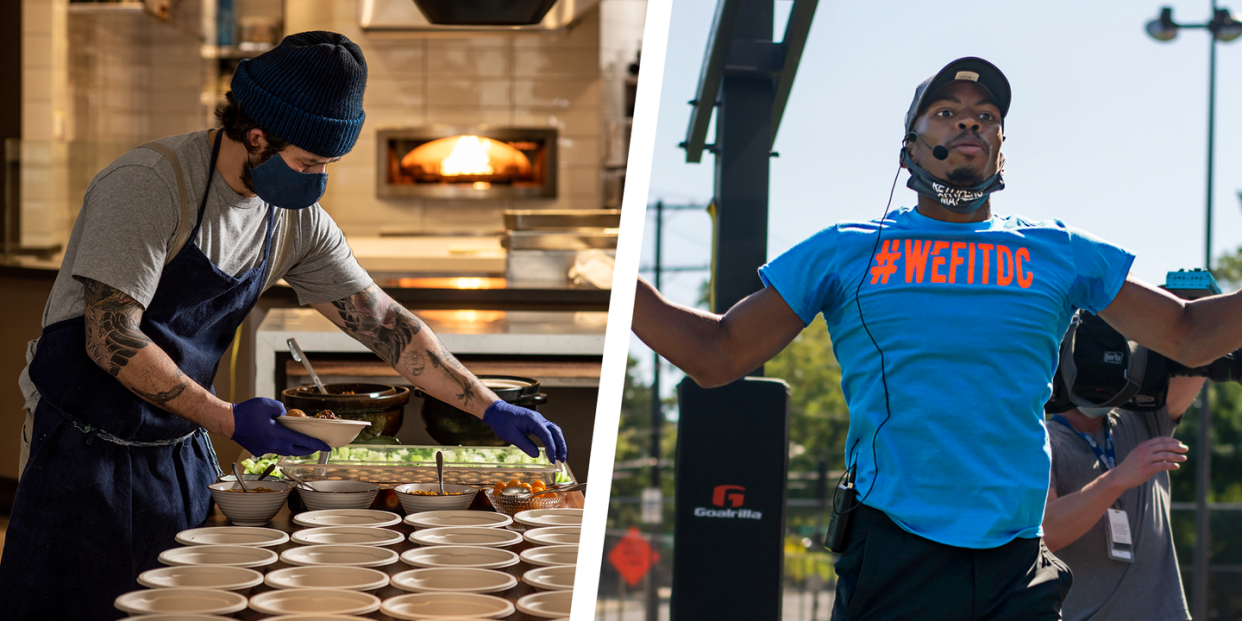
SOME CALL it the “helper’s high”; others, “warm-glow giving.” Whatever name you attach to the sensation, a growing body of evidence indicates that doing good for others can actually make you feel better—and that’s just the start of how your perspective may begin to change.
The helper’s high is linked to a flood of mood-enhancing chemicals released in your brain during the act of kindness. While the novelty of simple pleasures like food and sex is shown to wear off quickly, this rush seems to be endlessly on tap. There’s even evidence that altruistic behavior may boost your tolerance of minor and chronic pains.
Perhaps that’s because we’re hardwired to recognize that community building is one of the cornerstones of modern civilization. Donating your time, experience, or even cold hard cash can bring joy to others, be a release, build bonds with more people, and—especially as you see the change in others’ lives—fill your own life with a broader purpose. “It is a happiness that lasts, partly because it creates meaning in your life,” says Emma Seppälä, Ph.D., a director at Stanford University’s Center for Compassion and Altruism Research and Education.
Over time, that may result in health gains, too. Researchers in the UK found that people who volunteered at least once a month reported better mental health than those who gave less. And a recent Harvard study showed that adults over 50 who volunteered at least 100 hours per year— that’s less than two hours each week— had a reduced risk of mortality, greater physical activity, and fewer depressive symptoms compared with their peers.
Even if you’re short on money, time, or attention, there are still plenty of ways to pay it forward in 2021. Here are five methods of making a difference that feels personally uplifting.

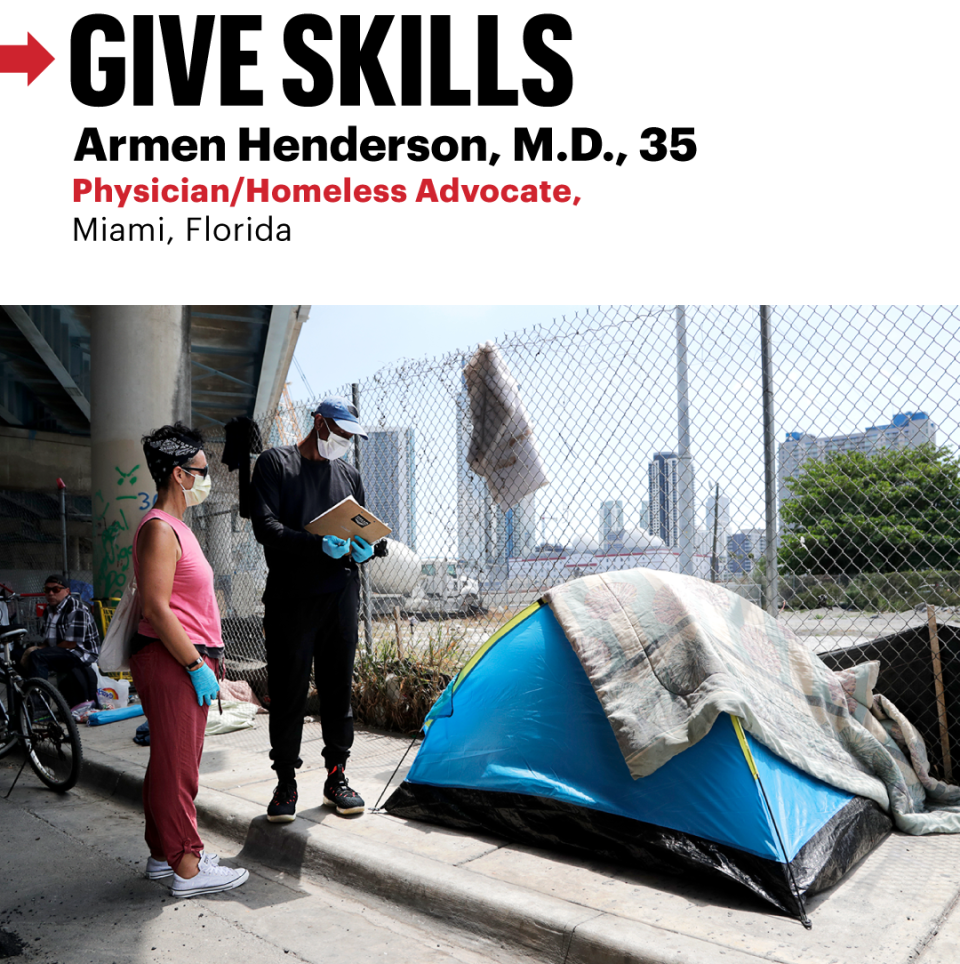
EVERYBODY SAYS they go into medicine to help people. I’m in the hospital seven nights a week, then I have seven days off, but outside the hospital is where I feel like a doctor the most.
We have a disaster-relief coalition made up of several nonprofits, including one I started in 2018 called Dade County Street Response. Miami goes through a crisis every year with hurricane season, and the government does not respond [well] to vulnerable communities like our unsheltered population. When the pandemic hit, we started giving out tents, food, and toiletries. We were treating wounds and doing COVID-19 tests. We set up a full-service bathroom site so people could use the toilet and take a shower. These are life extenders, sometimes on the order of 15 years, if people have access.
I think I suffer from a mild case of depression. Doing the work that I do in my community is like therapy. This is a way to get physicians into the community, where I think things really matter.
Take Action:
Reach out to a volunteer network like TaprootFoundation.org or Catchafire.org. They match your skills to nonprofits that need help in everything from finance and web design to marketing and strategy.

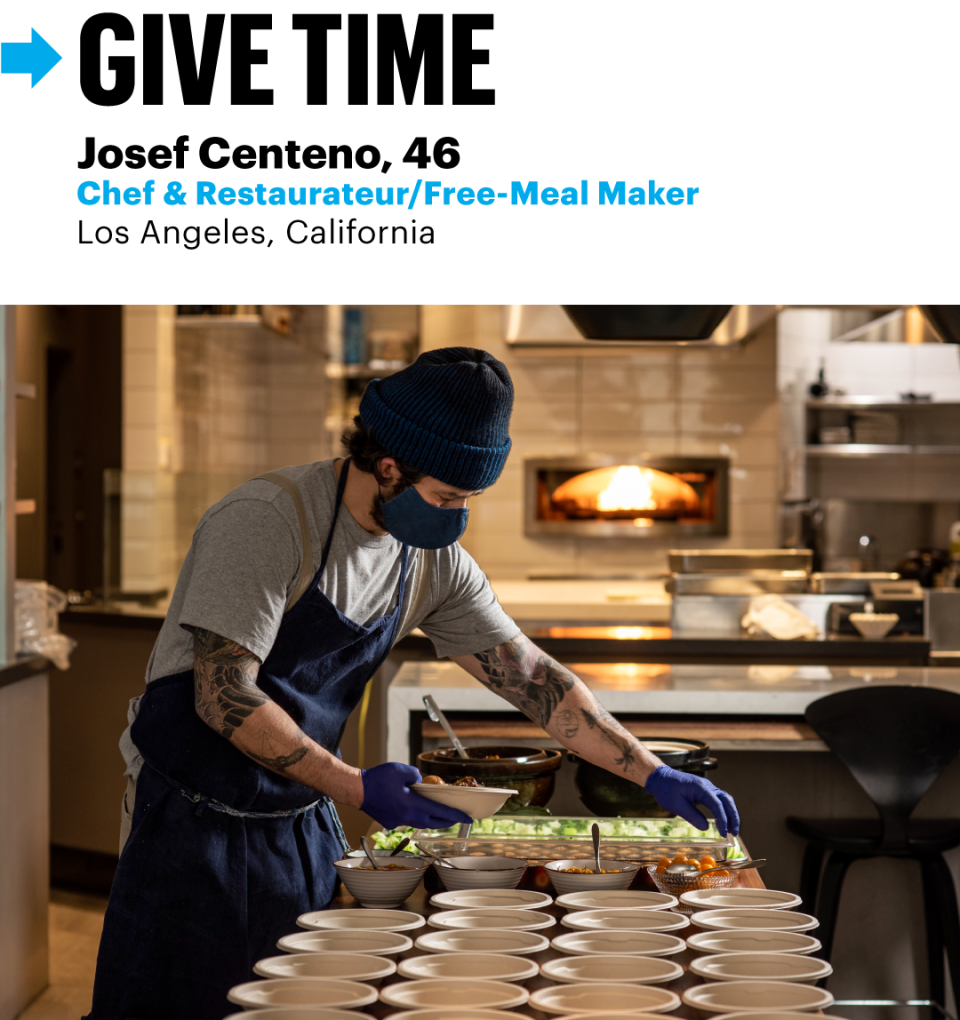
A WEEK into the pandemic, we decided to close all the restaurants and furlough or lay off employees so they could get a jump start with unemployment before shit hit the fan.
Despite my being distraught about everything that was happening, my friend introduced me to Lola Glaudini, who cofounded a nonprofit called Dine11 with her close friend Chris Sey. They began by donating meals to hospitals all over L. A., especially to those with less funding. So for over two months, I would cook two or three days a week, providing more than 1,000 meals.
Being able to do this gave me purpose, and I was glad I was able to help in any small way that I could. So I found prepping and cooking in solitude calming for me in very uncertain times. Something that’s lacking a lot right now is common decency, just trying to take care of people in any way that you can.
Take Action:
Local food banks and soup kitchens often need support, especially now. VolunteerMatch.org lets you search by city or even ZIP code for groups seeking different kinds of assistance. There are various ways to help virtually and in person.

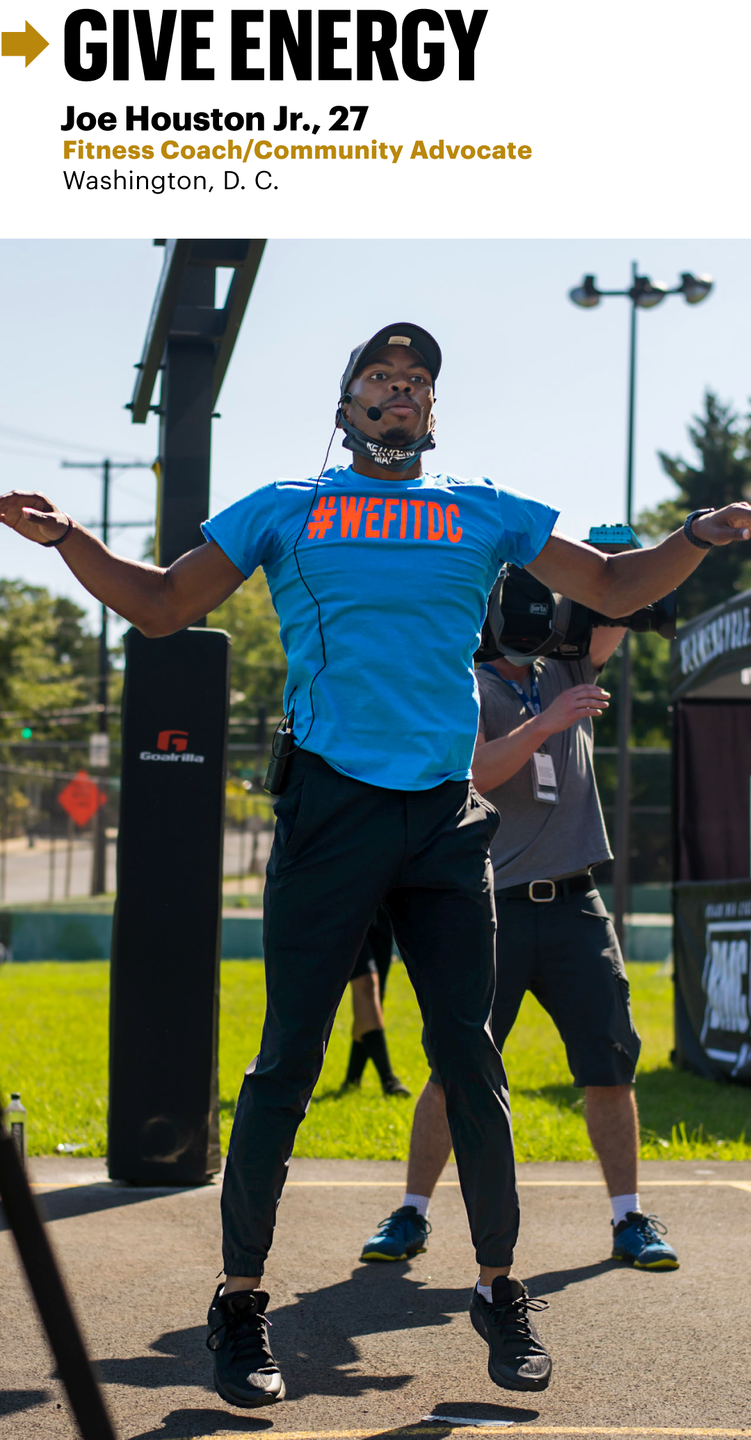
MY MOTHER died when I was 13, and I always say the street life was my father. I was incarcerated on a gun charge, and during my sentence I got involved in fitness and working out. When I came home at 21 years old, I knew my purpose: to empower people through wellness.
When COVID-19 hit, my neighborhood, Ward 8, didn’t have the most cases in D. C., but we had the most deaths. There’s only one grocery store and no gym. So in June, I started #WeFitDC, an initiative that aims to close the health and wellness gap in our district. I give free workout sessions to the community. We have food drives with only nutritional options. During a back-to-school event, we gave out 600 book bags. We had an event that focused on anxiety and depression.
When I was being released from prison, one of the correctional officers said, “You’ll be back.” That got to me. I just want to empower my community and lead by example.
Take Action:
Start a walking, running, or exercise group that’s inclusive. Pay for a trainer or earn your own qualification via the National Academy of Sports Medicine or the National Strength and Conditioning Association.


MY OLDER brother started coaching Little League after he graduated from the University of Hawaii, where he also played baseball. He asked if I wanted to join him, and I’ve been coaching now for more than 25 years (and my team won the 2018 Little League World Series).
I work from home, so that gives me flexibility. Practices are up to two and a half hours long, three or four times a week. It gives me something to look forward to at the end of my day.
It’s like I always stress to my kids: It’s not about you—it’s about we. The great thing about coaching is when you see these kids improve. You can tell that they just feel better about themselves. That alone is priceless.
Take Action:
Coaching your kid’s team is the gateway, but also check with your local rec
department for opportunities. You may need to do a CPR course and online training. Not sporty? Mentor with Big Brothers Big Sisters of America.

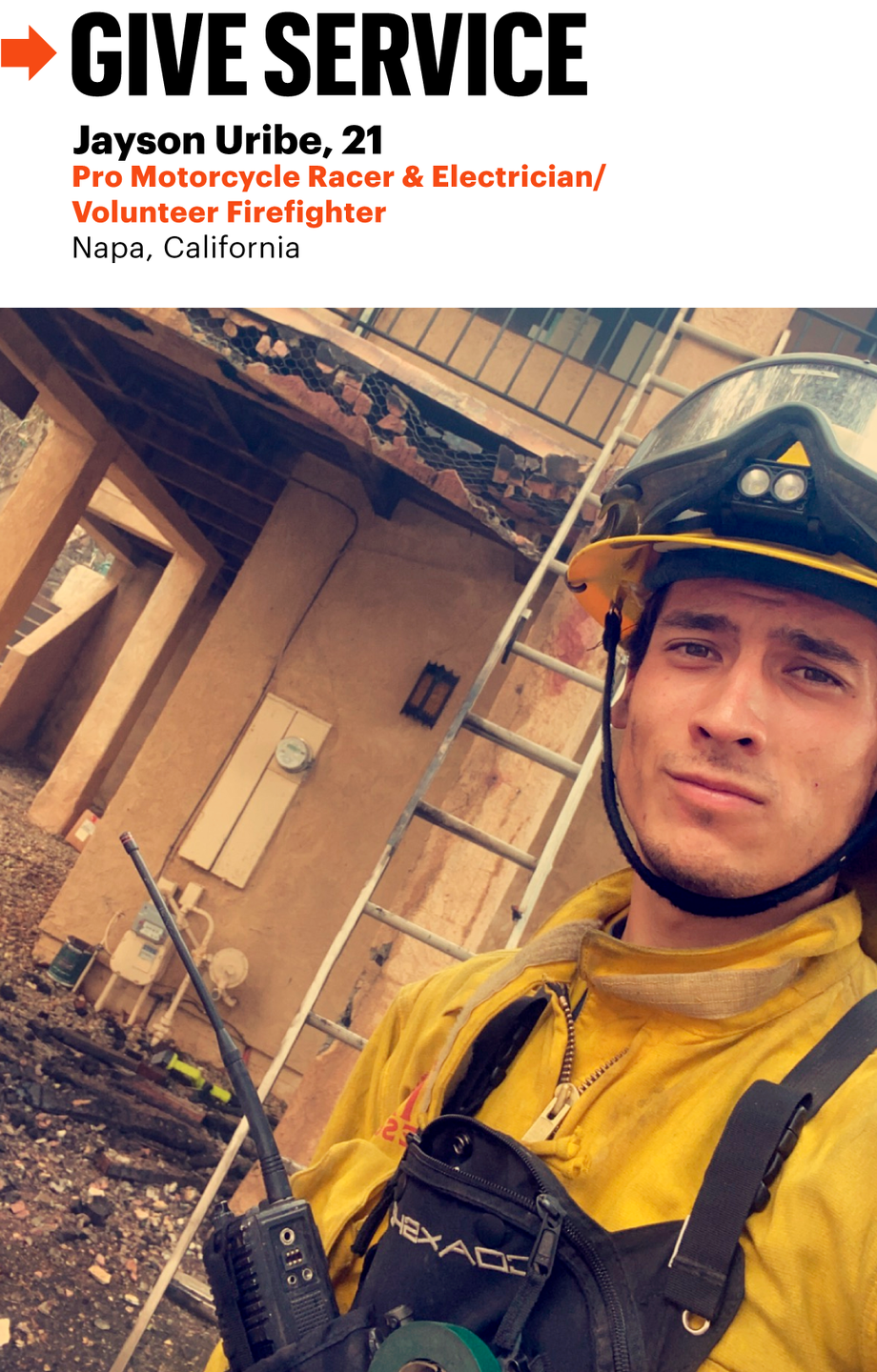
IN 2017, the Tubbs Fire in northern California was less than five miles away from where I call home. I wanted to help, but I couldn’t. So I became a volunteer firefighter with the Napa County Fire Department.
With motorcycle racing, I’m thankful I’ve had success, but it’s always been about me. But with firefighting, it’s the complete opposite. The team environment and being able to support a community that I’ve grown up in is really what attracts me to it.
The 2020 Glass Fire started a quarter mile away from our fire station. Being able to drive up and down the road and see the buildings we did save makes me really happy. Fear doesn’t really set in. It’s more like you’re doing a job. And I’ll do whatever it takes to make sure I help as much as I can.
Take Action:
Local fire departments help you find where to get training, and the American Red Cross organizes disaster-response teams in times of need. If you’re civic-minded, you can join a trash pickup, plant trees, or build trails in your community.

And Yup, You Can Give Money
DONATING 2 PERCENT or more of your income can result in a significant boost in life satisfaction, according to researchers at Indiana University. Spend smart by keeping these tactics in mind.
Check Up First:
The online charity evaluator Charity Navigator grades groups using a four-star system for accountability and transparency and for financial health. You can view best-of lists by cause category. Is a local group not listed? It might be new or small. Dive deeper on Guidestar.org.
Crowdsource It:
GoFundMe lets you give to people personally appealing for help with everything from unexpected medical costs to expenses for sports teams. Unsure who needs it most? Find a cause “hub” that pools donations to split evenly.
Maximize Returns:
Some employers match donations so that wherever you’re giving, you’ll double the impact. Or get creative and start a donor lottery with friends. Everyone antes up monthly, then draws straws. Whoever wins should be ready to share where the pot will go and why.
This article appears in the January/February 2021 issue of Men's Health.
You Might Also Like

